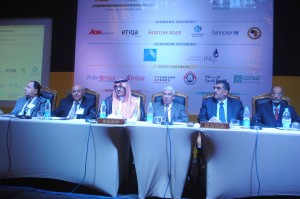
(Photo by Mohamed Omar)
By: Lamia Nabil
The second day of the 7th International Takaful Summit, which is being hosted by Egypt for the first time, kicked off today.
The first session discussed takaful prospects for the African market, which panel members said had huge potential but also posed challenges which must be faced and met by the takaful industry if it is to get a foothold on the continent.
Some of the challenges which the panel discussed included the lack of public awareness about the takaful industry, as well as the lack of available financial infrastructure necessary for the industry to truly kick off in Africa.
Managing Director of Africa Retakaful Omar Gouda said that the industry needs to provide solutions through a variety of means that people trust and understand. “The products that we are supplying, the distribution channels we are employing, and the rules and regulations we adhere to, must all be understood clearly by everyone,” he said.
Unlike conventional insurance companies, takaful operators have to start from scratch in training staff, establishing branches and offices, educating regulators on Sharia law, and applying the latest technological methods to what is ultimately still a fledgling industry.
Many traditional investments used by insurers are out of bounds for takaful operators. This results in the risk being spread less evenly, and can put takaful companies at loggerheads with the regulator.
However, the Islamic investment market is growing, and there will be more opportunities for takaful operators to hold a spread of Sharia-compliant investments and assuage any concerns a regulator may have.
Panel members also highlighted that regulation has proven to be another challenging issue, due to the difficulty in passing special laws for Sharia-compliant products.
By necessity, most takaful operators in Africa reinsure via conventional reinsurers due to the lack of takaful reinsurance, or retakaful, on the continent. This, however, is changing, with the large global reinsurers now creating takaful departments.
Another challenge, certainly not unique to any fladgling market, is developing awareness and understanding of the industry, its operations and products. The common perception among many Muslim communities is that insurance is unlawful.
As such, the target market needs to be educated about takaful and its compliance with Sharia law in order for the industry to fulfill its potential.
The day’s second session also discussed the importance of retakaful.
“The Middle East has great potential, as the penetration rate for takaful is still very low, both for life as well as non-life services,” said Adham Al-Muezzin of Hannover ReTakaful. This is in contrast to other countries such as Malaysia or Saudi Arabia, he said, where retakaful and takaful started with retail-level services and progressed to the larger-scale risks associated with the non-life product lines.
Takaful companies, if they are to grow and prosper, the panel concluded, will need a Sharia-compliant retakaful market. These companies must also try to emulate the prudence with which conventional insurance companies pass on a proportion of their exposure to secondary markets in the form of reinsurance companies.
It is to meet this requirement that retakaful companies are increasingly being formed in the Middle East. Still, a major obstacle to retakaful is that although the concept and practice of risk-sharing has been present in Islamic societies since their earliest days, it has never been formalised until the relatively recent introduction of modern-day takaful products.




